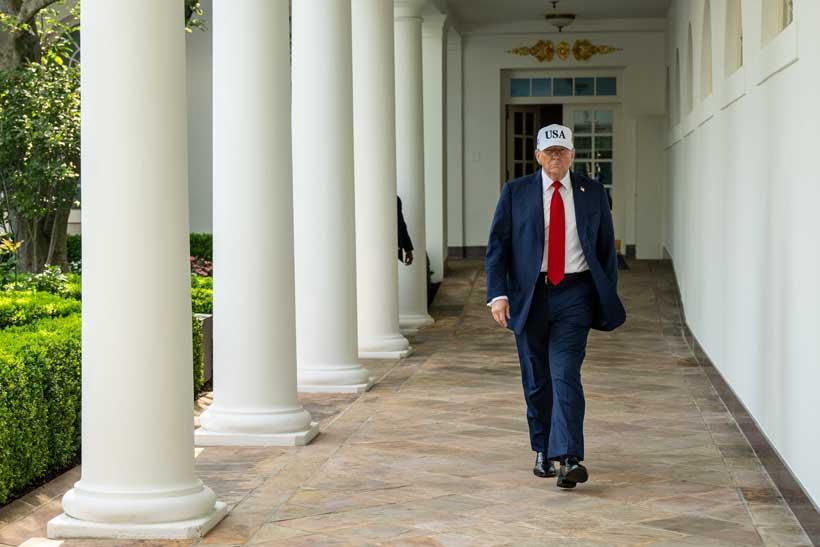By
Jacob Gibson
Africa-Press – Mozambique. Trump’s tariffs pose serious economic challenges to the United States and its western trading partners. In response to America’s tariffs, western countries should liberalize trade with each other to secure their mutual economic prosperity and security.
During his second administration, Donald Trump has ripped up the playbook of international trade. Trump has unilaterally raised tariffs on American adversaries and allies alike. These obstacles to trade are a foolhardy experiment in mutual economic destruction.
Free international trade is not without problems, but it has been critical in enriching the United States and the entire world. In aggregate it has increased employment, productivity, and living standards. From the poorest countries to the richest countries, all benefit from the higher economic growth and the availability of cheap and varied goods that international trade creates. Trump’s tariffs reduce mutually beneficial trade and pose a serious challenge to global economic prosperity.
Despite similar rhetoric, the second Trump administration has been much more radical on trade than the first. On April 3rd, Trump imposed a sweeping set of broad-based tariffs on all trading partners. A minimum 10% tariff was enacted on all countries, with certain countries and trading blocs, such as the EU, China, and Japan, to face far steeper rates. The exact rates were based on a bogus formula focusing on the size of the trade deficit and made no distinction between geopolitical allies and rivals. This and other tariffs radically increased the average tariff rate from 2.8% in 2020 to 14.5% (post-substitution) in June 2025. This is the highest average tariff rate since 1937. Exact US policy is full of uncertainty with rises, pauses, declines, and courts stymieing Trump. What is certain is that far higher trade barriers are the new norm in the United States.
In contrast to Trump’s delusions, these tariffs will be highly detrimental to the US economy. By reducing US imports and exports, they will harm US GDP, wages, and investment while raising unemployment and inflation. Yale’s Budget Lab has estimated that all 2025 US tariffs, plus foreign retaliation, would lower the US real GDP growth rate and reduce payroll employment by 376,000.
Following the initial shock and bewilderment, America’s western trading partners have had a dilemma of how to respond. Trump’s tariffs have severely damaged their economies. Partially due to Trump’s tariffs, the OECD has projected growth in global GDP slowing from 3.3% in 2024 to 2.9% in 2025. As OECD Secretary-General Mathias Corman stated, “Weakening trade ’has led to diminishing consumer and business confidence and curbing growth prospects.”
Unsurprisingly, many Western countries have been tempted to retaliate. Canada has threatened to increase duties on US steel and aluminum. More concretely, the EU approved tariffs targeting around $23.2 billion of US exports, including soybeans and poultry, and set out their ability to escalate further. Retaliations have a role in negotiations with America, but they are a dangerous tool. Imposing tariffs on the US will further harm western countries (just as US tariffs have harmed the US).
A far better strategy for western states is to liberalize trade between each other. In and of itself, the economic benefits of trade liberalization vastly outweigh its costs. Reductions in trade barriers would likely lead to higher economic growth and better living standards.
In the context of Trump’s tariffs, the case for trade liberalization is even stronger. It makes up for the loss of trade with the USA, reducing the costs of US tariffs. It also reduces Trump’s leverage over other Western countries and thus strengthens their hands in trade negotiations with the US.
There have been promising signs. Canada and the United Kingdom have agreed to establish a new trade working group. India and the UK signed a free trade deal under which bilateral trade may rise to as much as $34 billion a year from 2040 (according to the World Economic Forum). There have even been hopeful moves towards an Australian-EU trade agreement with the recent revival of talks in the wake of Trump’s tariffs. Talks had been suspended since 2023 but revived in the wake of Trump’s tariffs. As Australia’s trade minister, Don Farrell, told Reuters, “Both Australia and the EU recognize that now is the time to strengthen our economic partnership, and we’re working through the remaining issues to try and finalize the deal.”
Yet to rise to the challenge of Trump’s tariffs, Western countries must take larger and faster strides towards trade liberalization. The glacial pace of many negotiations must rapidly accelerate. Governments should also fast-track the ratification of signed free trade agreements. More fundamentally, ambitions should rapidly increase; timidity is not in order. Trade agreements should cut tariffs across the board rather than sparse reduction for specific industries.
Trump’s tariffs are a terrible, ill-thought-out idea that will damage the economic health of America and her trading partners. The response of Western countries is critical. If they erect their own permanent trade barriers, the consequence to the global economy would be devastating and long-lasting. If instead they rise to the urgency of the situation and liberalize trade with each other, the results are likely to be far more promising.
moderndiplomacy
For More News And Analysis About Mozambique Follow Africa-Press






